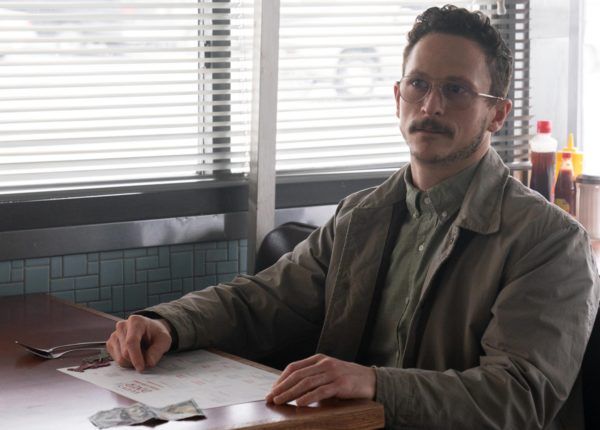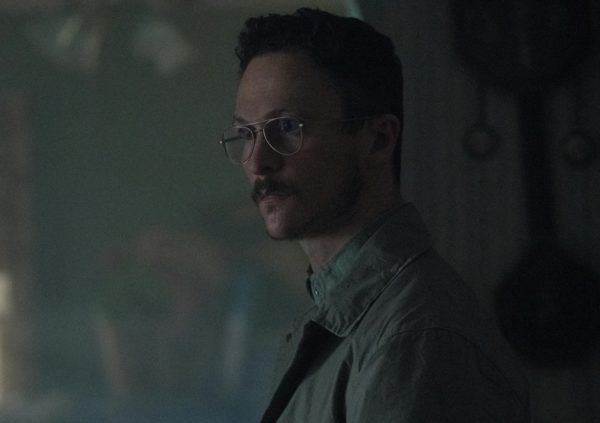Directed by Anne Sewitsky and written by Mary Laws (who is also the show creator), the episode of the Hulu anthology series Monsterland entitled “Port Fourchon, Louisiana” follows a down-and-out waitress named Toni (Kaitlyn Dever). With the young mother questioning her life choices, she comes across a mysterious man who goes by Alex (Jonathan Tucker) whose unsettling behavior leads to questions with dangerous answers.
During this 1-on-1 phone interview with Collider, Jonathan Tucker talked about the appeal of Monsterland, adding different colors and shades to the role, what made the character like an octopus, and what makes co-star Kaitlyn Dever so special to work with. He also talked about how much it means to him that Kingdom has found an all-new audience on Netflix, having originally been canceled after three seasons, how hard it was to say goodbye to that character, and the hope that they’ll return for a limited season at some point, along with his next series, NBC’s Debris.
Collider: This character are so interesting because it’s hard to know what to make of him. What did you make of this episode of Monsterland, when it came your way?
JONATHAN TUCKER: Sometimes you get a lot of preparation for a role, for lots of different reasons, like the pre-production has longer or shorter time frames. This was a really short time frame. Sometimes, and it certainly was the case with Monsterland, that can be really exciting because everybody is all hands on deck. It’s like being in the pit of a Formula One race car race, where everybody is moving with purpose and spirit and speed. And so, we really tried to figure out how we could incorporate who I am and the work that I was doing on the character before I got to New York to shoot it, and all of the elements they had already established tonally and with other characters. It was really exciting because the director of the project (Anne Sewitsky) and Mary Laws, the creator, were interested in finding lots of different colors and shades on the day, in terms of the performances. We could try lots of different things, take by take, and we were united in the goal that I always have, which is working towards the editing room versus working towards the success on the day. Success on the day means success in the editing room.
It’s such an odd character. What was the focal point in figuring him out?
TUCKER: What you’re describing is how I feel about octopi, the animal. They’re kind of alien but they’re also aquatic. They can be ferocious but they can be really gentle. They’re cognizant and they have a consciousness. They’re very malleable, and they can be big and small. They’ve got these big, incredible eyes and tentacle bodies. They can be really friendly and really vicious. So, I started from there, and Mary and I, with her whole team, tried to play that out a little bit. The lack of clarity on the character, from an audience point of view, the opaque, form-shifting nature of character is very deliberate.
Were there also things that you did physically?
TUCKER: We’re always doing things physically. You’ve gotta take a stab at these characters and just go for it. If it doesn’t work, it doesn’t work but you have to make a choice. Everybody is different, physically. Your mother is very different, physically, in the way she moves, from your girlfriend in high school, from the woman who’s cutting your hair. You can tell everybody is different by their gait and physicality and you have to make those decisions when you’re putting together a role. When the timing is so brief, you really have to take a leap.
Is it also interesting to play someone who really seems to only speak when necessary?
TUCKER: Yeah. Without giving away spoilers for the episode, he’s trying to find his voice, as much as he’s trying to find comfort in the physicality of this skin. The less talking and the more listening and observing is in concert with this octopi nature.
Right from the opening of the episode, you make quite an impression, and then we spend the rest of the episode trying to figure out exactly what’s going on. Is there something fun about just throwing the audience in and not really giving them information about the character or what’s going on?
TUCKER: There’s this thing that Paul Schrader talks about, which is transcendental work and how far back you can lean in a performance, or in directing or writing or wardrobe or any of the departments, to bring the audience in. The challenge or danger is that you lean too far back and they lean too far forward, and then it doesn’t work. But if you can try to calibrate both the narrative structure and the work of the different people putting together the story, so that the audience is leaning in as you’re leaning back, you end up inviting the audience to participate and bring their own experiences to color the work versus trying to tell them what to do or inflicting your will. That’s much more dynamic storytelling.
We really get to know your character through his interactions with Kaitlyn Dever’s character. What was it like to work with her and have that odd dynamic between your characters?
TUCKER: She’s a very close friend of mine, and we had worked together in a very odd dynamic on the last season of Justified. I’m hard pressed to think of a better actress in her generation. Critics can say that and she can have all of the awards but I get the privilege and awe-inspiring honor of getting to sit across from her, closer than even the camera, when you’re getting her tightest coverage. I never talk like this but I just haven’t seen anybody as truly talented as she is. You’re in the scene and you’re like, “I can’t believe that I get to be working this closely with somebody of this magnitude and this level of talent.” That happens in coverage. When you’re in the scene, you’re really in the scene. But when you’re being a little more technical about where her eyeline is to the camera, and as the camera moves in closer, it becomes significantly less about it the connection of the scene and becomes more tenuous and a little more technical, you get to really appreciate being an audience member versus being a participant, in moments, here and there.
After how underappreciated Kingdom was in its initial run, what’s it been like to see it become a hit on Netflix and to see it find this whole new audience that’s embraced it and become passionate about it?
TUCKER: It’s so gratifying to be asked that question. We gave everything to those characters and to that story. You’re never working to an audience. It’s not histrionics. You’re trying to be authentic and reflect a world and a group of people, with a sense of veracity and not a sense of, how can I affect an audience? So, to have people now responding to it and finding it, it feels good. It doesn’t change the work or what we’ve done but it’s just very gratifying on a superficial level. The thing about social media is that people hit you up. I probably get two or three people a day that reach out, who are in a really, really challenging place in their lives or a really dark place, and a few people a week where it’s touch and go, in terms of whether or not they’re gonna stay with us, and it’s easy to reach out and let them know that you hear them and see them. I’ve been very moved by that power and the affect that it has on our fellow man because we’re all in this leaky boat together and we’re all trying to connect. Whether it’s that we’re bumping into each other on the street or we’re creating content that enters into the homes or the screens of people around the world, we’re communicating. And so, the unique thing about social media right now is that, for a few people, you can get the opportunity to let them know that they’re seen and heard, and that means a lot. I know that because I’m a fan of people too that I don’t know. If somebody writes back and says, “Hey, I appreciate you reaching out, thanks so much,” it makes you feel like a million dollars, and imagine if you’re in a place where you’re gonna commit suicide.
Kingdom deserves every bit of recognition and attention that it’s getting, and it’s the same for everyone of you that was involved with it but at the same time, from a selfish place, I’m like, “Where were all of you people when I wanted a fourth season?”
TUCKER: I know. It certainly stands out for us who are a part of it, as well. It’s great to just be able to literally tell people where they can find the show. Look, I wouldn’t be surprised if we came back and did like a six episode limited thing, somewhere at sometime. I’m doing an NBC show now but the TV landscape is changing and network television is maybe even excited about putting some of their casts into other projects because it only helps the project that they have with those cast members.
What is the show that you’ll be doing with NBC?
TUCKER: It’s a show called Debris. It’s a project that’s written and run by Joel Wyman, who created a show called Almost Human, which I loved, a few years ago. He also ran the last few seasons of Fringe. It’s a really fun world, kind of like Black Mirror, The Twilight Zone and The X-Files type of show, with a big over-arching mythology. It’s a really fun two-hander. I don’t know where network TV is gonna be in the next few years and I really wanted do a network show. This is the coolest version that I could see of that and I think Joel is one of the most talented people on the face of this planet. So, I’m really excited about this. We’re threading the needle, in terms of COVID. Everybody is committed to getting the show done and getting it done safely. From the conversation that I had with Joel, there’s a lot to do here. We’re both willing to hold hands and jump together and take some risks, there should be a lot that we can find, off the page
When you played Jay Kulina in Kingdom, you really threw yourself fully into that character. Do you think that you would ever want to do that again, to that extent, again or do you try to find some distance now?
TUCKER: That’s all I wanna do but there’s only so many characters that you can do that with. I’m on this earth to do those sorts of roles but you can’t force that. You can only do so much with what you have. There are a lot of really compelling characters that don’t demand the extent of that work. It’s tough to answer because every character demands the same amount of depth and commitment but that one just took it further and the range was greater.
Was he a character that was particularly difficult to say goodbye to and leave behind?
TUCKER: Yes. Nobody ever tells you how to do that. There are a million books on acting and how to build a character. There’s not a single one that I know that tells you how to say goodbye. It’s literally like a death, seriously. I will tell you that saying goodbye like that feels like saying goodbye to people that I know that have died.
Do you think it would have been any easier, if you’d actually had closure on your own terms, or would it have been hard, no matter what?
TUCKER: No, you’re still saying goodbye. That’s like asking, would you rather somebody die in a car crash or of cancer? I don’t know. It’s just hard. It’s hard to lose somebody.
Have you had another character that’s done that to you?
TUCKER: No because he’s the one that took up four years of my life. Time is an important element in all of these things, that people don’t often talk about.
Monsterland is available to stream at Hulu.
Christina Radish is a Senior Reporter of Film, TV, and Theme Parks for Collider. You can follow her on Twitter @ChristinaRadish.



